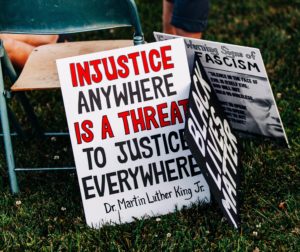For Juneteenth, we want to take a moment to honor the incredible legacy of the millions of abolitionists, organizers, and freedom fighters that dedicated – and continue to dedicate – their lives to ending violence against Black people and other people of color. Their work – of mass protest, nonviolent direct action, and resistance – is what makes it possible for the United States to begin to live up to the ideals of equality, freedom, and liberty espoused by our leaders. It is what enables so many of us at Redstone, as well as our friends, families, and communities, to be able to live as we are and to con tinue to advocate for the rights that we all deserve.
tinue to advocate for the rights that we all deserve.
Anti-Black violence is not history, however. It is a tragic and terrifying part of everyday life in the United States. Our country’s political, economic, and civil systems continue to do violence to and exploit Black people and other people of color. For example, nearly 500,000 Black Americans are currently incarcerated. Beyond exposing Black people to even more violence and exacerbating mental illness, incarceration can often take the form of explicit torture: solitary confinement, beatings, and denial of medical care. Black prisoners continue to be used as exploited labor – paid a few cents an hour to pick cotton from the land slaves worked on less than 200 years ago. And looking beyond incarceration, we see how Black people are persistently denied equal opportunity – in everything from access to housing, good-paying jobs, wealth-building, and health.
This is all to say that the collective work of liberation is not done. It is work that we all must commit ourselves to – not passively, but with intention. We must accept that we are responsible for creating a more just world. As Bryan Stevenson of the Equal Justice Initiative states,
“each and every one of us bears responsibility for writing the next chapter of history… we will not let hate win.”
As an organization that helps our clients develop and implement strategies to change society, Redstone is positioned to advance this vision of a more just world. We aim to help our clients deepen their attention to racial equity, advancing the specific ways their grantmaking can help tackle the root causes of systemic racism. We work to elevate new ways of thinking about reconciliation and repair in the context of the harms committed against Black people, Indigenous people, and people of color. And, we are intentional in our recognition of the ways that social sector institutions may serve to perpetuate, rather than combat, injustice.
This is an ongoing learning process. We have worked over the last year to deepen our personal and shared firmwide understanding of these concepts and continue to explore best practices to advance equity in our projects. We aim to take what we have learned into the work we do on a day-to-day basis. In this effort, we have:
- Assessed the ways that philanthropic institutions reinforce, and can potentially combat, white supremacist and neocolonial ideologies (e.g., through their grantmaking practices, accountability efforts, and strategies for giving)
- Explored philanthropy’s history of advancing or hindering just outcomes through their giving (i.e., how the recipients of their grantmaking support certain services, policies, social movements, and governments that combat or exacerbate inequality and suffering)
- Considered the moral obligations of the wealthy and philanthropists to advance racial justice, given the broader context of how and why certain people are able to accumulate wealth
We have been fortunate to work with clients who are thinking critically about their ability to advance justice, in particular racial justice. In our partnership with California Forward on the California Dream Index, we helped create a new tool that aggregates key indicators of well-being (including air quality, housing affordability, early education access) to understand racial disparities across California communities and help coordinate equity-oriented action by public sector decision-makers. We have also established and grown our Inclusive Impact practice, which aims to advance anti-racist grantmaking and research practice by elevating the voices of people of color in philanthropic decisions and re-framing how data is used within the social sector, among other approaches.
As a historically White and majority-White firm, we have not always recognized the unique responsibility we have to work alongside Black people to end Black oppression and advocate for racial justice. We are thankful to those activists and scholars that have supported our learning and recognize the need to continuously learn about how we can do this work better. We look forward to continuing this journey in solidarity with leaders and communities that have been doing this work for generations.